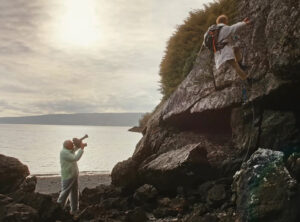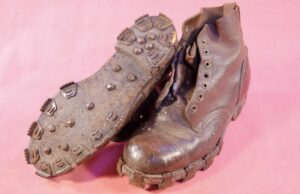On South Korea’s Jeju Island, the Haenyeo women harvest sea life from the ocean, as divers. Their freedom and financial independence reverse gender norms, but they are proud to install these values upon their impressionable daughters. Sometimes the women give birth at sea.

The Haenyeo: working mothers who have reversed gender norms. Photo: How Stuff Works
Normally, when a woman decides if she is going to become a mother for the first time, she also decides something less obvious: whether or not to shed the person she has been all her life previously, to become a new person selflessly devoted to another human. The decision can mean trading lifelong careers and cherished pastimes for a gender-specific role.
The Haenyeo women did no such trade. They have been around for hundreds of years, spending long, physical days diving from boats to collect mollusks, seaweed, and other marine life. They are their family’s primary provider. Considered the first working women in their country, they have carved a new family dynamic where their husbands take care of domestic duties, and a sisterhood evolves between the Haenyeo women.
Today, the Haenyeo are celebrated as one of Jeju’s most valued treasures, and for their contribution to society, the Korean government subsidies their equipment and grants them exclusive rights to sell fresh seafood.
One woman not born into the Haenyeo sisterhood, but who was adopted into it, is national spearfisher and freediving champion Kimi Werner. At the time of filming, the Hawaiian-born Warner is six months pregnant with her first child.

Kimi Werner always wanted to be a mother but recognized it would likely mean trading her love for the ocean. Then she became part of the unique sisterhood of the Haenyeo women. Photo: KimiWerner.com
By the time Werner was in her 30s, she was making a living by spearfishing and freediving. She worked mostly alongside men. She noticed that they returned to the ocean almost immediately after becoming fathers. For her, it seemed that the lifelong dream of becoming a mother would mean trading her love of the ocean.
When she met the Haenyeo women, she realized there was an alternative. Many of the Haenyeo have three or four children. The kids stay with other mothers or at home with their fathers during infancy. Meanwhile, the mothers headed the household by working at sea. Some of the women were in labor while in the ocean, others gave birth on the boat. They are proud, satisfied, and fiercely strong.
It’s a concept that Werner appreciates — being able to continue working with the ocean while being a mother — but one I struggle to relate with.
As a working, stay-at-home mother to a 20-month-old daughter, it’s difficult keeping up with work commitments, domestic duties, toddler bonding, and juggling the right levels of her independence, social interaction, and stimulation. But despite the challenges, I couldn’t wave goodbye to her in the morning with her confused eyes staring back at me. But that’s the conundrum with being a mother, isn’t it? You aren’t the person you were before, you don’t understand who you’ve become but equally you can’t comprehend doing your version of the role any other way.
If the Haenyeo women have found the perfect balance for their families, then they truly are the most valued treasures. In any case, they are pinnacles of strength.






